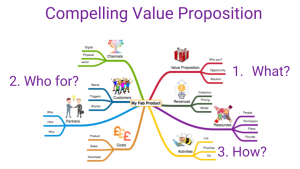 Following the third sessions between our aspiring leaders from Rolls-Royce and their entrepreneur clients in Bangladesh, our group coaching call focused on the Value Proposition. From earlier posts in this series, you may recall that our clients had learned about business consulting, but had not attracted any customers. (You can start from the beginning here). Motivation was partly to blame. For reasons described last time, they were not getting out to speak to prospective clients. Even those talking to clients, still need to convince them of the benefits of trying new things if they are to win work.
Following the third sessions between our aspiring leaders from Rolls-Royce and their entrepreneur clients in Bangladesh, our group coaching call focused on the Value Proposition. From earlier posts in this series, you may recall that our clients had learned about business consulting, but had not attracted any customers. (You can start from the beginning here). Motivation was partly to blame. For reasons described last time, they were not getting out to speak to prospective clients. Even those talking to clients, still need to convince them of the benefits of trying new things if they are to win work.
A Value Proposition makes sales and profits effortless
 Surprisingly few SMEs really understand value propositions. All over the world, people sell exactly the same things to exactly the same people. This lack of difference leads to a price race to the bottom to make sales. The needs and aspirations of chosen customers are the roots of effective value propositions. They are not copied or designed by committee or strategy consultant. Instead, they need persistence, research and trial and error to refine. This suits our Rolls Royce consultants well. They don’t need to be experts in the needs of farmers or shop-keepers in rural Bangladesh. Instead, they ask probing questions and hold clients to account, vitally encouraging better understanding of what customers really want. Experiencing the trials and tribulations of resilience and agility as their clients experiment, they are discovering the innovator’s journey at first hand. It is a far more powerful experience than reading about it in a book. Many aspiring entrepreneurs give up before they truly adapt their product for their market.
Surprisingly few SMEs really understand value propositions. All over the world, people sell exactly the same things to exactly the same people. This lack of difference leads to a price race to the bottom to make sales. The needs and aspirations of chosen customers are the roots of effective value propositions. They are not copied or designed by committee or strategy consultant. Instead, they need persistence, research and trial and error to refine. This suits our Rolls Royce consultants well. They don’t need to be experts in the needs of farmers or shop-keepers in rural Bangladesh. Instead, they ask probing questions and hold clients to account, vitally encouraging better understanding of what customers really want. Experiencing the trials and tribulations of resilience and agility as their clients experiment, they are discovering the innovator’s journey at first hand. It is a far more powerful experience than reading about it in a book. Many aspiring entrepreneurs give up before they truly adapt their product for their market.
A value proposition is also a case for change
Convincing people to change is a common need in today’s workplace. Rarely is it done well. In shaping compelling arguments with clients, our aspiring leaders are building a case for change. Value Propositions explain the benefits of doing things better in a way target prospects will understand. People don’t change unless they get the benefits. This is why developing a value proposition is so much more than marketing communications. It is about influencing change, a point so critical that we return to it in our next session.

